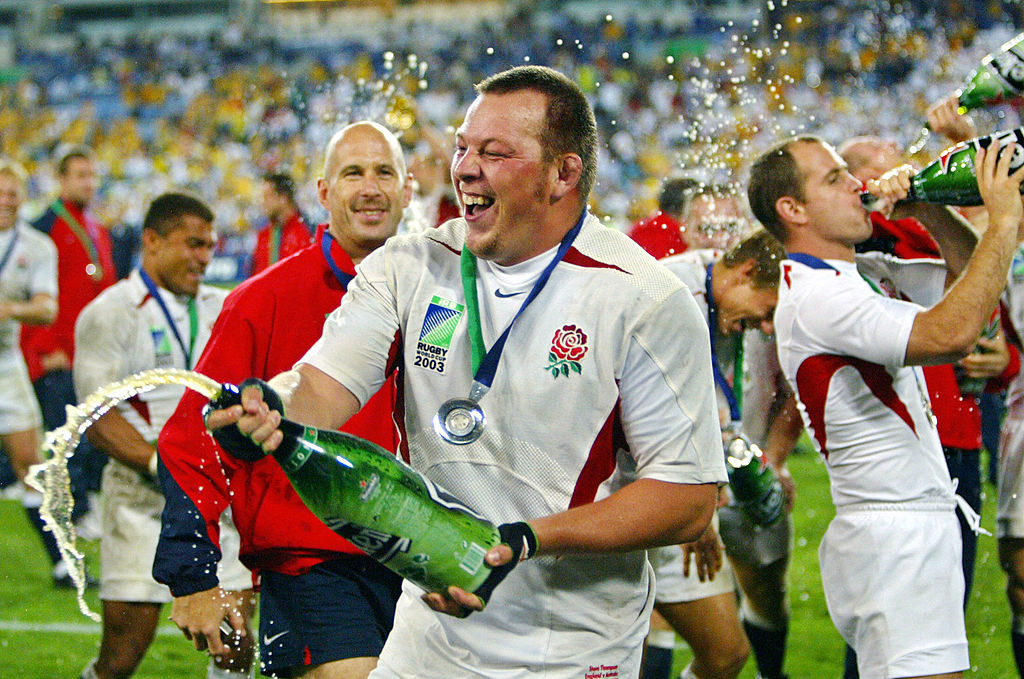The Six Nations begins today, bringing joy into the hearts of millions of rugby fans. It will, as ever, be a predictably unpredictable tournament – there are always upsets – which will showcase great athletic skill, close teamwork and raw physical courage; and like the first snowdrops, it is one of those reliable harbingers of spring guaranteed to lighten the gloom of cheerless February days. But this year, hovering in the background, is a spectre at the feast; the fast-accumulating evidence that rugby is a danger to the players’ health and well-being.
The truth is that many rugby spectators, who love the game, end up feeling guilty. Celebrating a huge momentum-stopping collision in midfield, or a brutally effective ‘clear-out’ by forwards at the ruck, is much less fun when you remember that the players might be jeopardising their long-term welfare.
The story of Steve Thompson, one of the heroes of England’s 2003 World Cup-winning squad who has, aged 42, been diagnosed with early-onset dementia and probable chronic traumatic encephalopathy is one that wrings the heart. Thompson, an iron man who gave his all for the team, can no longer even remember winning that Cup and fears he will end up being a burden to his wife and family. Not much glory in that.
A strict application of health and safety would probably end the game forever
Thompson was one of the first generation of professional players and, from the way he tells it, that was part of the problem. Coaches who had previously had their players for a couple of nights a week now had them full-time; many of them used that time to ‘beast’ their young men – toughening them up with brutal drills and endless fitness routines. As a result, the game became more physical and, though not much recognised at the time, more dangerous.
Things have changed a bit now – there are ‘health protocols’ in the professional game so any player who looks a little woozy after a collision is immediately ordered to undergo a ‘head injury assessment’. If there’s any sign of concussion, off they go. But however many protocols are enforced there’s no getting away from the fact that rugby can damage your health. Danger can never be eliminated in a game where big, fit, competitive young men engage in extreme physical confrontations.
A few weeks ago, Wasps were playing Sale in a league match. It was a fast, thrilling contest and at one point Wasps winger Zach Kibirige, was running full-tilt chasing the ball as it neared the Sale line; flying up behind him was Marland Yarde and both men flung themselves at the ball. Yarde landed on top of Kibirige and knocked him out cold.
What caught my attention about this (fairly routine) rugby incident was the reaction of the broadcaster, BT Sport. Usually incidents like this are replayed so we get to see what actually happened, but this time there were no replays. It was, apparently, too grisly for public consumption. And what I read into that was that the sport is developing a new sensitivity about its image.
Which is not surprising because the health hazards of rugby are a clear threat to its long-term survival. How many mothers are going to be happy watching their sons involve themselves in a sport with such clear risks? Back in the day it was possible to plead ignorance – and that ignorance took its toll.
Recently I learned of the death of a contemporary of mine from schooldays; Tim was a nuggety little scrum-half who, as his obituary had it ‘was always in the thick of the action’; he died in his mid-sixties in a care home suffering from dementia. Causality cannot be proved. But it makes you think.
The rugby authorities are well aware of all this – how could they not be? – but so far no grand plan to make the game safer has been unveiled. There are clearly things that could be done – broadly to introduce rule changes that lessen the dangers of concussion – but, rugby people ask, will rugby be recognisable if a health and safety culture takes root? A strict application of H&S would probably end the game forever. Which would be a loss because rugby, in its essentials, is a wonderful game and also quintessentially British.
At a time when the Union appears under threat from the Anglophobic SNP, rugby serves as a useful reminder of the ties that bind us all together; we might have generously allowed the French and Italians to join in the fun but the tournament remains, at heart, an internecine British affair.
The fierce rivalries that will be on display this weekend are the ‘Good Union’ made flesh; a reminder that be we English, Irish, Welsh or Scottish we share deep cultural affinities. More than just a game will be lost if rugby cannot find some way of preserving its essential character without asking the players to play Russian roulette with their future health.






Comments